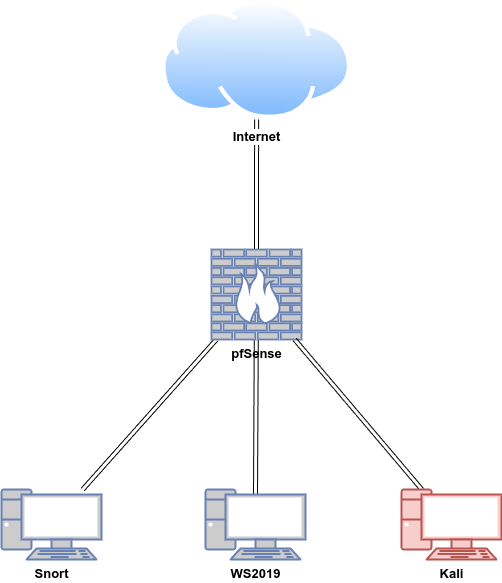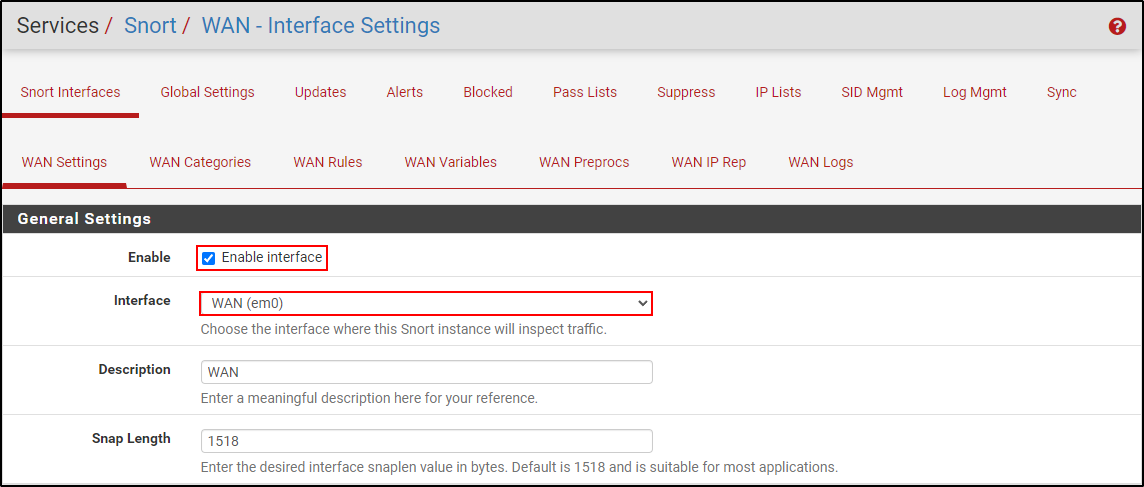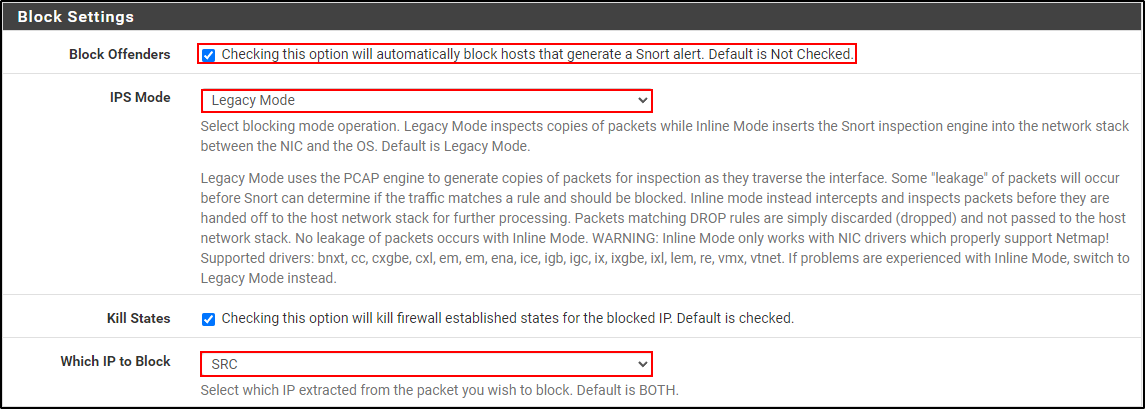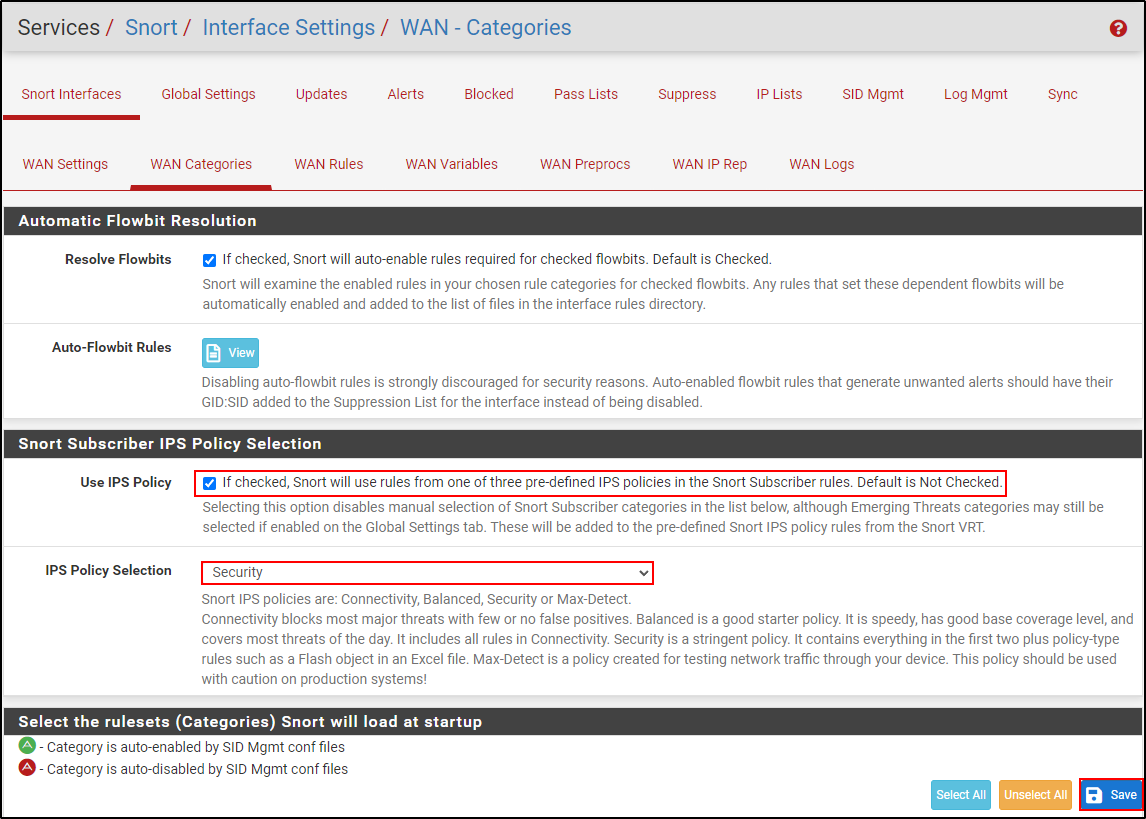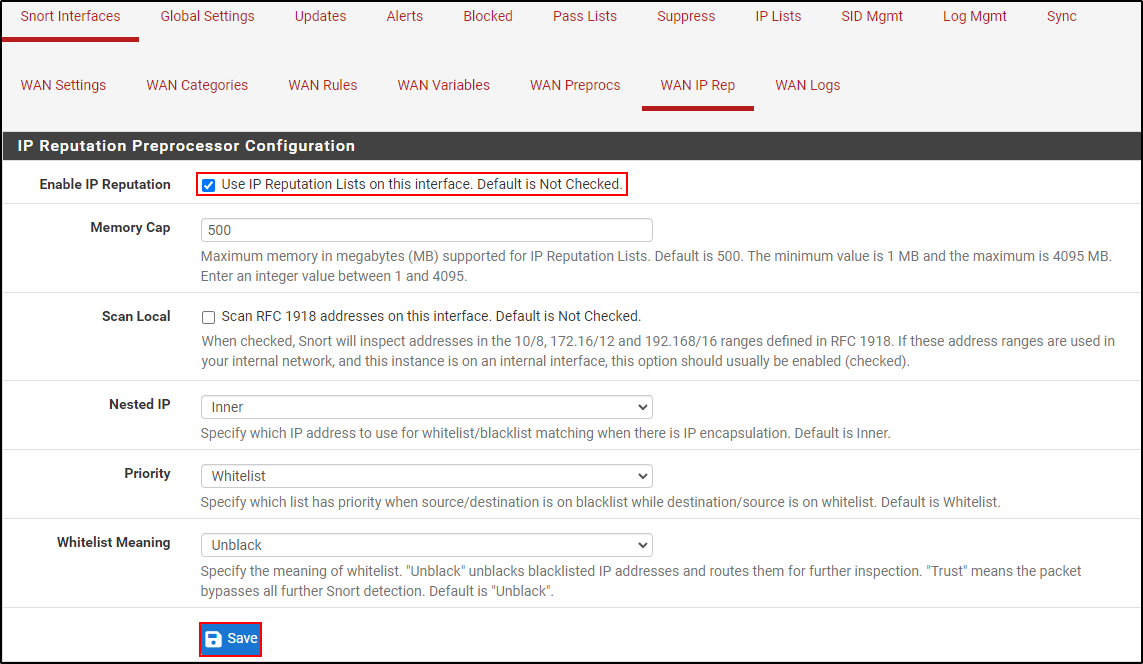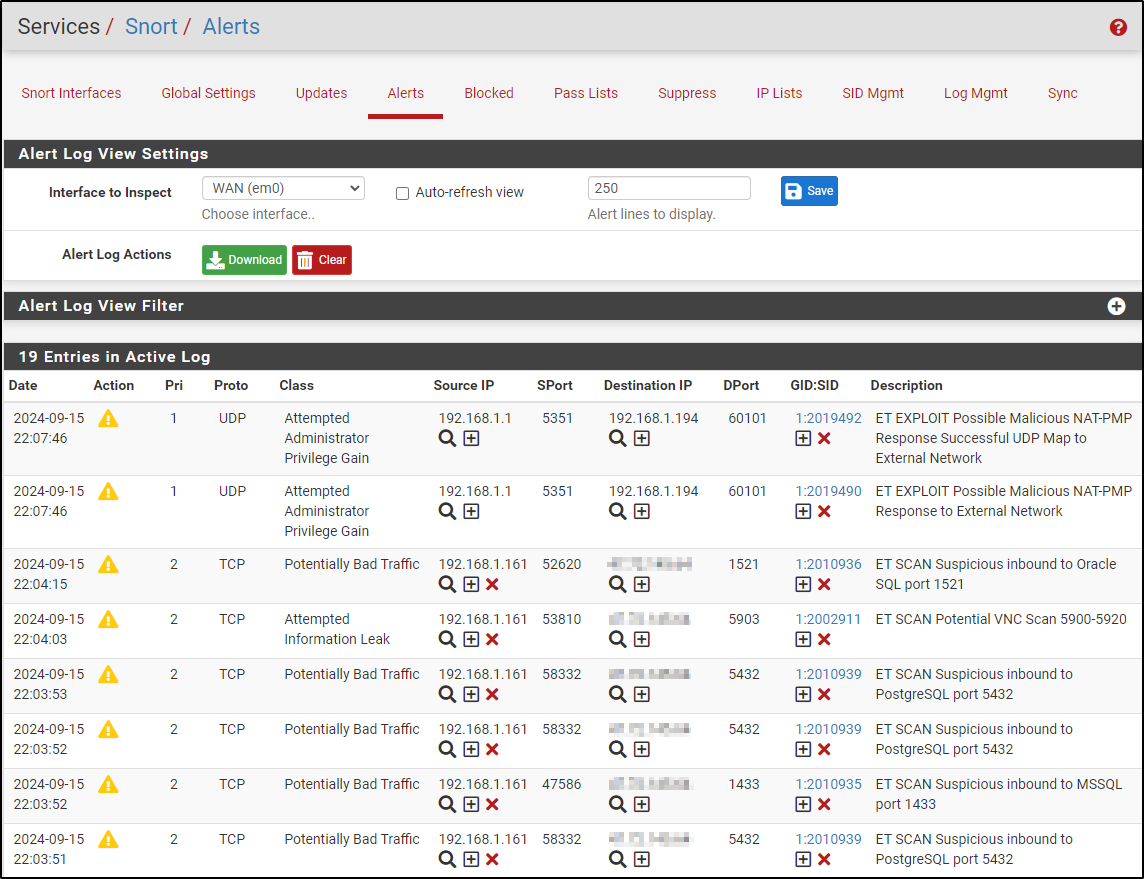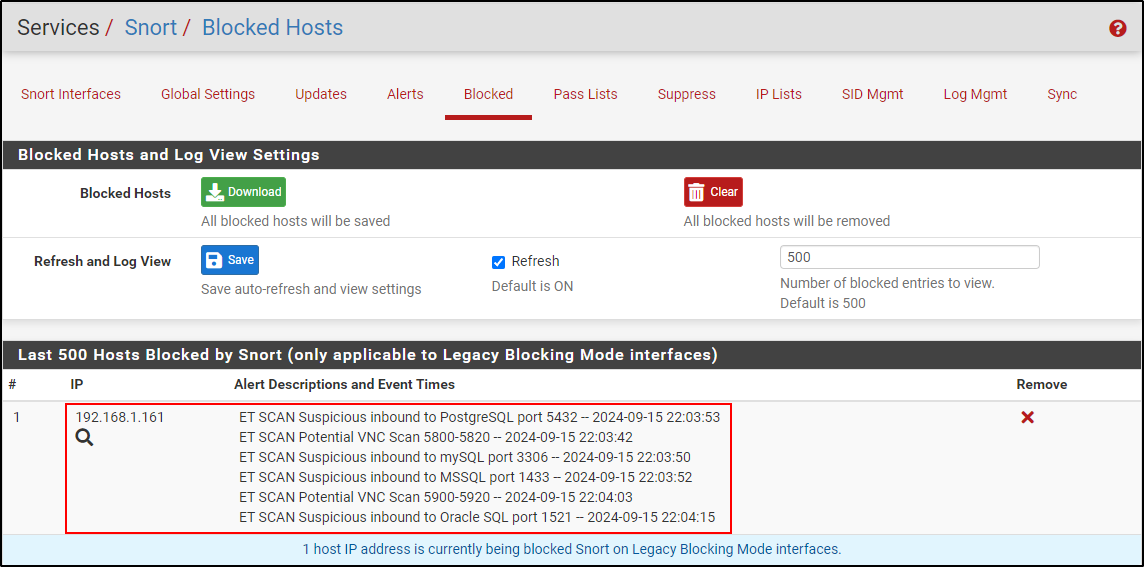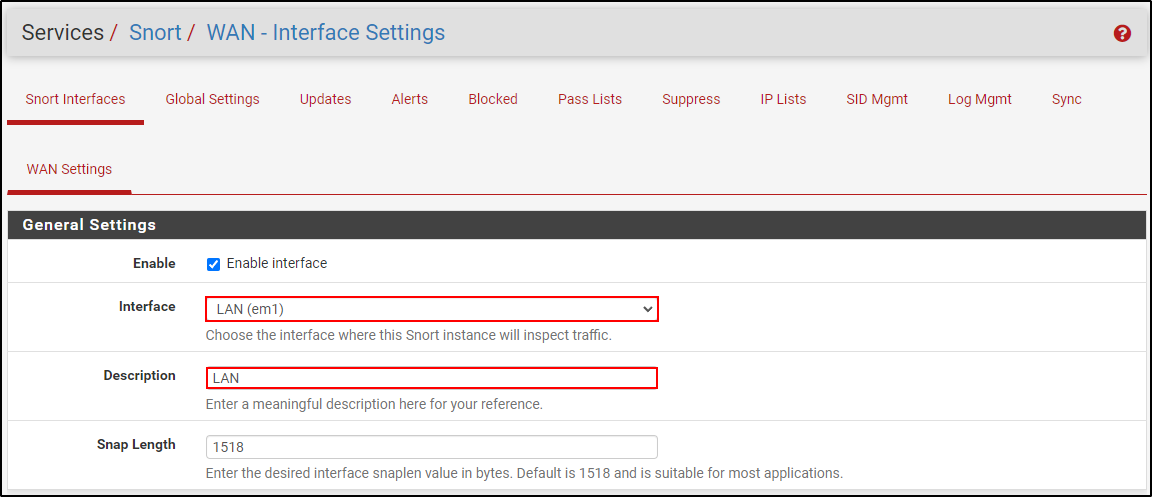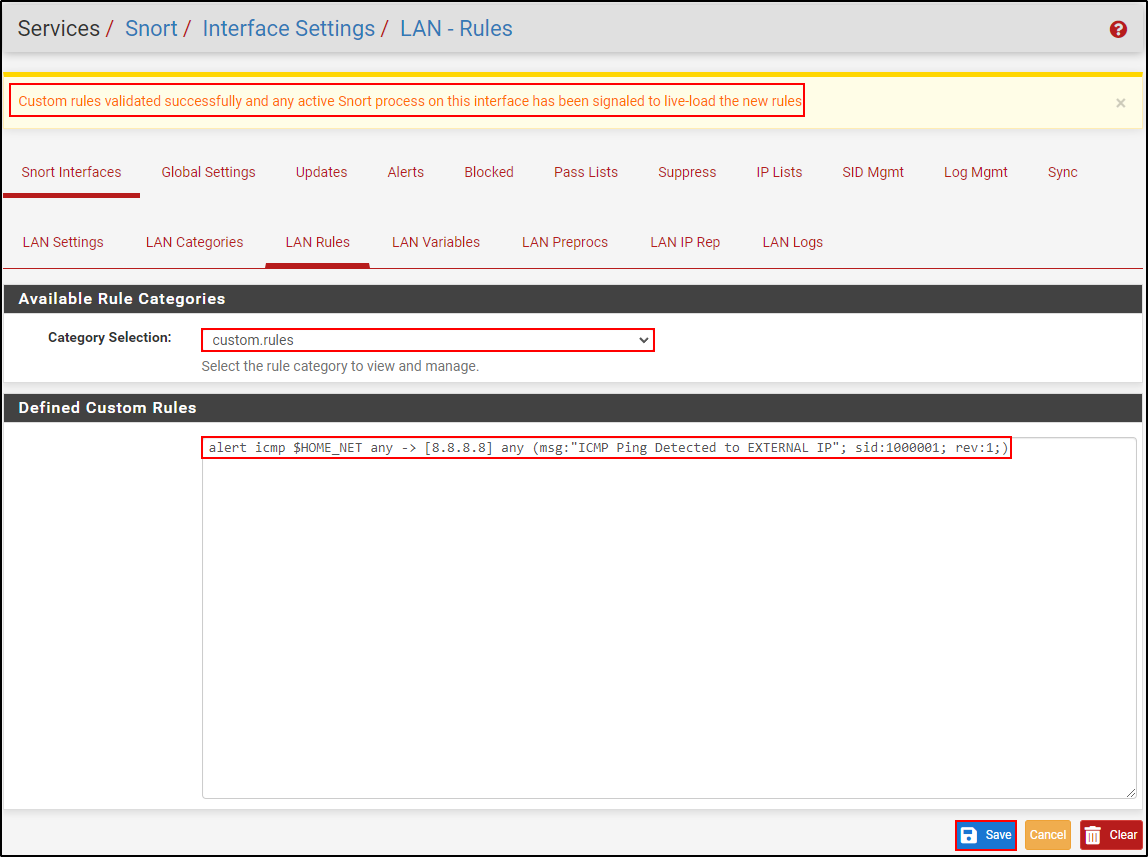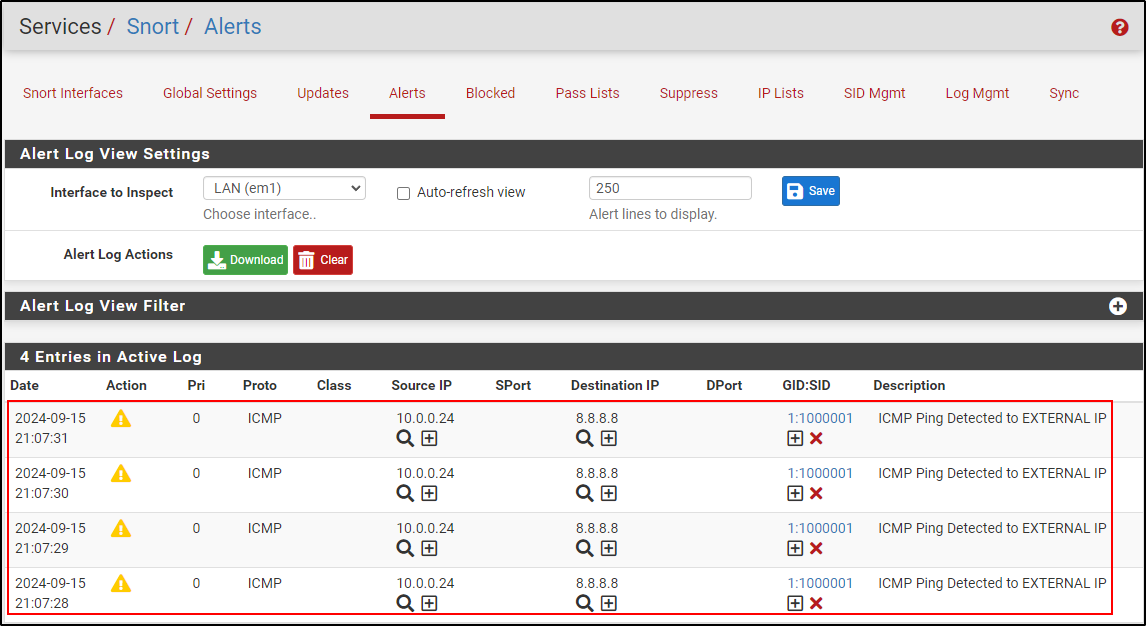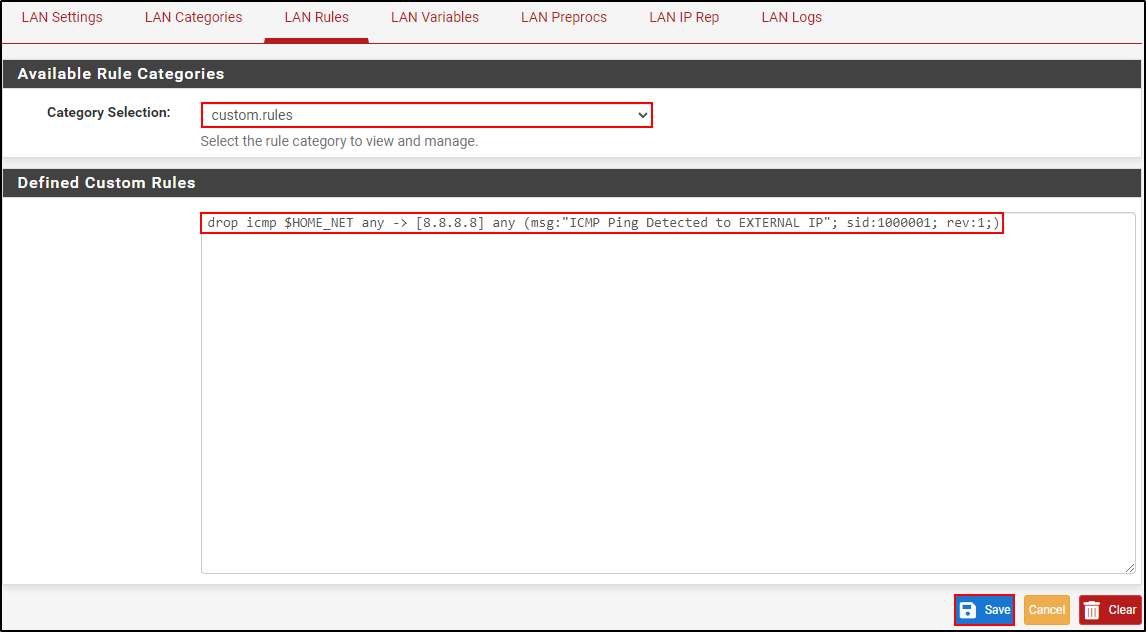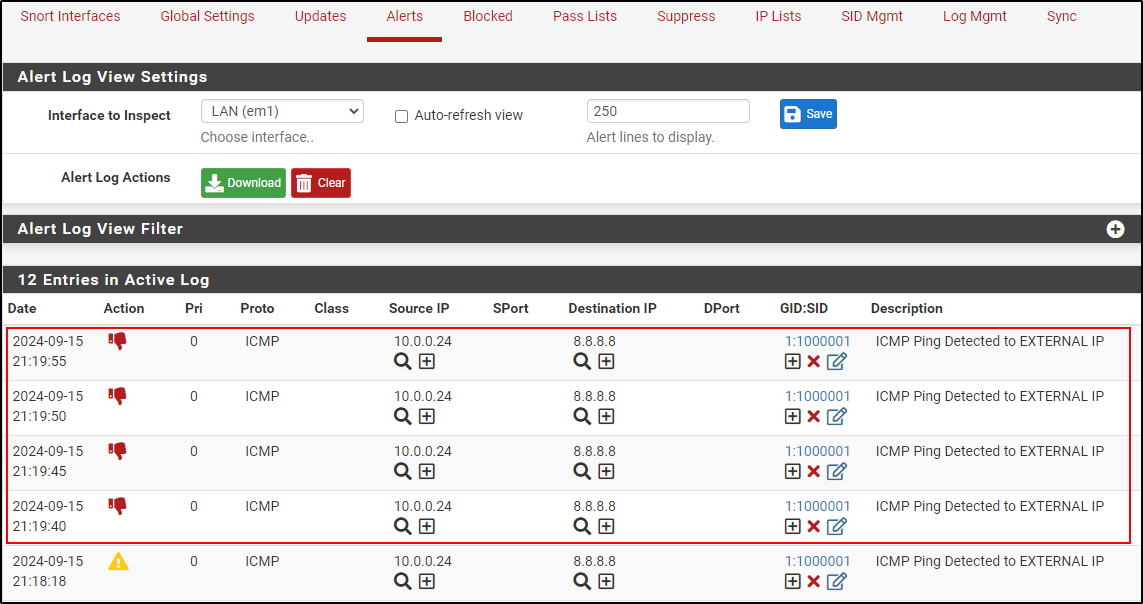Snort
Snort is an open-source network intrusion detection and prevention system (IDS/IPS) maintained by Cisco Systems. It is designed to monitor network traffic in real-time, analysing packets for signs of malicious activity, such as attacks, probes, or scans. Snort uses a combination of protocol analysis, content searching, and various preprocessors to detect and prevent intrusions.
Install Snort3 on Host
In this demonstration, we will be installing Snort3 on an Ubuntu virtual machine. We will be simulating install in an air-gapped environment but note that some parts of the step requires internet connection.
Lab Setup for Proof of Concept
In this proof of concept, attack simulation was conducted on the Kali machine in a safe and controlled setting.
Note: Do not attempt to replicate the attack simulation demonstrated here unless you are properly trained and it is safe to do so. Unauthorised attack simulation can lead to legal consequences and unintended damage to systems. Always ensure that such activities are conducted by qualified professionals in a secure, isolated environment.
| Host | OS | Role | IP Address |
|---|---|---|---|
| pfsense | FreeBSD (pfSense v2.7.2) | Firewall/Router (Gateway IDS/IPS) | 192.168.1.200 (WAN) / 10.0.0.2 (LAN) |
| Snort | Ubuntu 22.04 LTS | Host IDS/IPS | 10.0.0.22 |
| WS2019 | Windows Server 2019 | Windows client | 10.0.0.24 |
| Kali | Kali Linux 2024.2 | Attacker machine | 10.0.0.29 |
Download Pre-requisites
On a machine with internet connection:
Make a folder called /snort/pre-reqs and cd into it.
Update the package lists and upgrade all the installed packages on your system to the latest available versions.
Download the required packages and their dependencies as a root user:
apt-get install -y --download-only build-essential autotools-dev libdumbnet-dev libluajit-5.1-dev \
libpcap-dev zlib1g-dev pkg-config libhwloc-dev cmake liblzma-dev openssl libssl-dev cpputest \
libsqlite3-dev libtool uuid-dev git autoconf bison flex libcmocka-dev libnetfilter-queue-dev \
libunwind-dev libmnl-dev ethtool libjemalloc-dev libpcre3-dev libpcre16-3 libpcre32-3 libpcrecpp0v5 -o Dir::Cache::archives="/home/cyber/snort/pre-reqs"
#apt-get download libpcre3-dev libpcre16-3 libpcre32-3 libpcrecpp0v5
If you get permission error, change the directory’s permission
Error message:
W: Download is performed unsandboxed as root as file '/home/cyber/snort/pre-reqs/libpcre16-3_2%3a8.39-13ubuntu0.22.04.1_amd64.deb' couldn't be accessed by user '_apt'. - pkgAcquire::Run (13: Permission denied)
Change the directory permission:
Download Dependencies and Snort3
Change directory into snort
Download dependencies (pcre, gperftools, ragel, boost, hyperscan, flatbuffers, libdaq, pulledpork3) and Snort by running:
wget https://github.com/PCRE2Project/pcre2/releases/download/pcre2-10.44/pcre2-10.44.tar.gz
wget https://github.com/gperftools/gperftools/releases/download/gperftools-2.15/gperftools-2.15.tar.gz
wget https://www.colm.net/files/ragel/ragel-6.10.tar.gz
wget https://boostorg.jfrog.io/artifactory/main/release/1.86.0/source/boost_1_86_0.tar.gz
wget [https://github.com/intel/hyperscan/archive/refs/tags/v5.4.2.tar.gz](https://github.com/intel/hyperscan/archive/refs/tags/v5.4.2.tar.gz) -O hyperscan-v5.4.2.tar.gz
wget https://github.com/google/flatbuffers/archive/refs/tags/v2.0.0.tar.gz -O flatbuffers-v2.0.0.tar.gz
wget https://github.com/snort3/libdaq/archive/refs/tags/v3.0.16.tar.gz -O libdaq-v3.0.16.tar.gz
wget [https://github.com/snort3/snort3/archive/refs/tags/3.3.5.0.tar.gz](https://github.com/snort3/snort3/archive/refs/tags/3.3.5.0.tar.gz) -O snort3-3.3.5.0.tar.gz
git clone https://github.com/shirkdog/pulledpork3.git
Install Pre-requisites
Transfer the snort folder to your air-gapped host.
Change directory into pre-reqs and install the downloaded .deb files using dpkg:
Install Dependencies
Change directory into snort folder and untar pcre2-10.44.tar.gz
Change directory into pcre2-10.44 and run configure.
Run make and then sudo make install.
Repeat the same process for gperftools-2.15.tar.gz
Repeat the same process for ragel
Untar Boost C++ Libraries:
For installing hyerperscan, run:
tar -xvzf hyperscan-v5.4.2.tar.gz
mkdir ~/snort/hyperscan-5.4.2-build
cd hyperscan-5.4.2-build/
cmake -DCMAKE_INSTALL_PREFIX=/usr/local -DBOOST_ROOT=~/snort/boost_1_86_0/ ../hyperscan-5.4.2
make
sudo make install
Install flatbuffers:
tar -xzvf flatbuffers-v2.0.0.tar.gz
mkdir flatbuffers-build
cd flatbuffers-build
cmake ../flatbuffers-2.0.0
make
sudo make install
Install Data Acquistion (DAQ) from Snort
Update the system's dynamic linker run-time bindings (shared libraries)
Install the latest version of Snort 3
tar -xzvf snort3-3.3.5.0.tar.gz
cd snort3-3.3.5.0/
./configure_cmake.sh --prefix=/usr/local --enable-jemalloc
cd build
make
sudo make install
Verify Snort3 is installed by running:
/usr/local/bin/snort -V
,,_ -*> Snort++ <*-
o" )~ Version 3.3.5.0
'''' By Martin Roesch & The Snort Team
http://snort.org/contact#team
Copyright (C) 2014-2024 Cisco and/or its affiliates. All rights reserved.
Copyright (C) 1998-2013 Sourcefire, Inc., et al.
Using DAQ version 3.0.16
Using Hyperscan version 5.4.2 2024-09-10
Using Jemalloc version 5.2.1-0-gea6b3e973b477b8061e0076bb257dbd7f3faa756
Using libpcap version 1.10.1 (with TPACKET_V3)
Using LuaJIT version 2.1.0-beta3
Using LZMA version 5.2.5
Using OpenSSL 3.0.2 15 Mar 2022
Using PCRE version 8.39 2016-06-14
Using ZLIB version 1.2.11
Test snort by using its default config file:
snort -c /usr/local/etc/snort/snort.lua
...
Snort successfully validated the configuration (with 0 warnings).
Find your network interface by running ip a
ip a
...
2: ens32: <BROADCAST,MULTICAST,UP,LOWER_UP> mtu 1500 qdisc fq_codel state UNKNOWN group default qlen 1000
link/ether 00:0c:29:86:08:64 brd ff:ff:ff:ff:ff:ff
altname enp2s0
inet 10.0.0.22/24 brd 10.0.0.255 scope global dynamic noprefixroute ens32
Run following:
sudo ethtool -k ens32 | grep receive-offload
...
generic-receive-offload: on
large-receive-offload: off [fixed]
Create a service to disable Large Receive Offload (LRO)
Copy and paste following:
Put your network interface
[Unit]
Description=Ethtool Configration for Network Interface
[Service]
Requires=network.target
Type=oneshot
ExecStart=/sbin/ethtool -K ens32 gro off
ExecStart=/sbin/ethtool -K ens32 lro off
[Install]
WantedBy=multi-user.target
Enable and start the service
Verify that LRO is disabled by running
sudo ethtool -k ens32 | grep receive-offload
...
generic-receive-offload: off
large-receive-offload: off [fixed]
Test IDS with local rules
Create a folder called rules in the following directory
Create a file called local.rules
Copy and paste following
First alert detects any ICMP Ping traffic and second alert detects any SSH Authentication Attempt to our internal network
alert icmp any any -> $HOME_NET any (msg:"ICMP Ping Detected"; sid:1000001; rev:1;)
alert tcp any any -> $HOME_NET 22 (msg:"SSH Authentication Attempt"; sid:1000002; rev:1;)
Run snort with configuration file to test the rule
snort -c /usr/local/etc/snort/snort.lua -R /usr/local/etc/rules/local.rules
...
Snort successfully validated the configuration (with 0 warnings).
Run snort to generate alert in a single line
Snort will be listening on ens32 for any icmp traffic
sudo snort -c /usr/local/etc/snort/snort.lua -R /usr/local/etc/rules/local.rules -i ens32 -A alert_fast
From another Linux host, execute ping and attempt ssh to 10.0.0.22. This will generate alerts on terminal verifying that the rule works:
09/11-22:01:05.659667 [**] [1:1000002:1] "SSH Authentication Attempt" [**] [Priority: 0] {TCP} 10.0.0.21:36708 -> 10.0.0.22:22
09/11-22:01:19.086427 [**] [1:1000001:1] "ICMP Ping Detected" [**] [Priority: 0] {ICMP} 10.0.0.21 -> 10.0.0.22
Edit Snort’s configuration
For HOME_NET, setup the network addresses you are protecting.
For EXTERNAL_NET, leave as any.
In the ips section, uncomment enable_builtin_rules = true and add include = “/usr/local/etc/rules/local.rules”, (include comma)
In the configure ourputs section uncomment alert_fast = {file=true} to enable logging for the alerts
-- HOME_NET and EXTERNAL_NET must be set now
-- setup the network addresses you are protecting
HOME_NET = '10.0.0.0/24'
-- set up the external network addresses.
-- (leave as "any" in most situations)
EXTERNAL_NET = 'any'
...
ips =
{
-- use this to enable decoder and inspector alerts
enable_builtin_rules = true,
-- use include for rules files; be sure to set your path
-- note that rules files can include other rules files
-- (see also related path vars at the top of snort_defaults.lua)
include = "/usr/local/etc/rules/local.rules",
variables = default_variables
}
...
---------------------------------------------------------------------------
-- 7. configure outputs
---------------------------------------------------------------------------
-- event logging
-- you can enable with defaults from the command line with -A <alert_type>
-- uncomment below to set non-default configs
--alert_csv = { }
alert_fast = {file=true}
Run snort to generate alert in a single line but exclude entry for local rules.
Snort will be listening on ens32 for any icmp traffic
Verify that alerts are generated from ping
09/11-21:41:15.522160 [**] [1:1000001:1] "ICMP Ping Detected" [**] [Priority: 0] {ICMP} 10.0.0.24 -> 10.0.0.22
09/11-21:41:15.522206 [**] [1:1000001:1] "ICMP Ping Detected" [**] [Priority: 0] {ICMP} 10.0.0.22 -> 10.0.0.24
To output alert_fast as a text log file, run
mkdir /var/log/snort
sudo chown -R 1000:1000 /var/log/snort
...
sudo snort -c /usr/local/etc/snort/snort.lua -i ens32 -A alert_fast -l /var/log/snort
Verify that alert_fast.txt file is generated
ls /var/log/snort
...
cat /var/log/snort/alert_fast.txt
...
09/11-23:16:18.831740 [**] [1:1000001:1] "ICMP Ping Detected" [**] [Priority: 0] {ICMP} 10.0.0.21 -> 10.0.0.22
09/11-23:16:37.707792 [**] [1:1000002:1] "SSH Authentication Attempt" [**] [Priority: 0] {TCP} 10.0.0.21:60514 -> 10.0.0.22:22
Install Pulledpork3
Note git clone https://github.com/shirkdog/pulledpork3.git command was run when downloading dependencies.
cd ~/snort/pulledpork3
sudo mkdir /usr/local/bin/pulledpork3
sudo cp pulledpork.py /usr/local/bin/pulledpork3
sudo cp -r lib/ /usr/local/bin/pulledpork3
sudo chmod +x /usr/local/bin/pulledpork3/pulledpork.py
sudo mkdir /usr/local/etc/pulledpork3
sudo cp etc/pulledpork.conf /usr/local/etc/pulledpork3/
Verify that pulled pork is running
/usr/local/bin/pulledpork3/pulledpork.py -V
PulledPork v3.0.0.5
https://github.com/shirkdog/pulledpork3
_____ ____
`----,\ ) PulledPork v3.0.0.5
`--==\\ / Lowcountry yellow mustard bbq sauce is the best bbq sauce. Fight me.
`--==\\/
.-~~~~-.Y|\\_ Copyright (C) 2021 Noah Dietrich, Colin Grady, Michael Shirk
@_/ / 66\_ and the PulledPork Team!
| \ \ _(")
\ /-| ||'--' Rules give me wings!
\_\ \_\\
~~~~~~~~~~~~~~~~~~~~~~~~~~~~~~~~~~~~~~~~~~~~~~~~~~~~~~~~~~~~~~
Edit pulledpork.conf
Change the community ruleset value to true.
Yon can select registered ruleset but due to incompatibility between registered ruleset version (3.1.7.0) and the snort version (3.3.5.0), selecting registered ruleset will give you an error. Either install Snort v 3.1.X.X or wait for registered ruleset version (3.3.X.X) to get released or use the community ruleset in the meantime.
Copy and paste your Oinkcode (API Key). This step is optional.
Comment out blocklist_path
Uncomment snort_path and make sure it is set to the right path
Uncomment local_rules and make sure it is set to the right path
Comment sorule_path (optional but if uncommented, make a directory /usr/local/etc/so_rules/)
# Which Snort/Talos rulesets do you want to download (recomended: choose only one)
community_ruleset = true
registered_ruleset = false
LightSPD_ruleset = false
# Your Snort oinkcode is required for snort/talos Subscription, Light_SPD, and Registered rules>
oinkcode =
# Where to write the blocklist file (single file containing all blocklists downloaded)
#blocklist_path = /usr/local/etc/lists/default.blocklist
# Where is the Snort Executable located (if not on the system path)
snort_path = /usr/local/bin/snort
# Local Rules files
# Specify local rules files, comma-separated
local_rules = /usr/local/etc/rules/local.rules
# where should so rules be saved
# so rules will only be processed if this is uncommented
sorule_path = /usr/local/etc/so_rules/
To obtain the Oinkcode, create an account in Snort3.
Run Pulledpork3
If you receive error below, make a directory called so_rules
ERROR: `sorule_path` is configured but is not a directory: /usr/local/etc/so_rules/
...
sudo mkdir /usr/local/etc/so_rules/
Troubleshooting for Registered Ruleset
If you have selected registered ruleset and receive the error below, edit snort rules version number in pulledpork.py
WARNING: Unable to load rules archive: 422 Client Error: Unprocessable Content for url: https://snort.org/rules/snortrules-snapshot-3350.tar.gz?oinkcode=<hidden>
Make a backup copy of pulledpork.py and edit pulledpork.py
sudo cp /usr/local/bin/pulledpork3/pulledpork.py /usr/local/bin/pulledpork3/oldpulledpork.py
sudo nano /usr/local/bin/pulledpork3/pulledpork.py
Edit RULESET_URL_SNORT_REGISTERED
The snortrules-snapshot version number can be found on https://www.snort.org/downloads
The numbers indicate version number so 31730 (v3.1.7.0) is the latest registered Snort rulest.
Community rules are free and maintained by the Snort community. Registered rules are available for free but require you to create an account on the Snort website and obtain an Oinkcode. Subscriber rules required a paid subscription and provides immediate access to the most up-to-date rules.
Test IDS with Community Ruleset
Rerun Pulledpork:
sudo /usr/local/bin/pulledpork3/pulledpork.py -c /usr/local/etc/pulledpork3/pulledpork.conf
...
Writing rules to: /usr/local/etc/rules/pulledpork.rules
Program execution complete.
Edit snort’s config to point to Pulledpork’s rules
Change the include path to point to pulledpork.rules
ips =
{
-- use this to enable decoder and inspector alerts
enable_builtin_rules = true,
-- use include for rules files; be sure to set your path
-- note that rules files can include other rules files
-- (see also related path vars at the top of snort_defaults.lua)
include = "/usr/local/etc/rules/pulledpork.rules",
variables = default_variables
}
You can see what the rules look like
Test Snort
snort -c /usr/local/etc/snort/snort.lua --plugin-path /usr/local/etc/so_rules/
...
Snort successfully validated the configuration (with 0 warnings).
Trigger alert by running:
Verify that alerts are generated by the community rules
09/16-23:11:10.392572 [**] [1:498:11] "INDICATOR-COMPROMISE id check returned root" [**] [Classification: Potentially Bad Traffic] [Priority: 2] {TCP} 217.160.0.187:80 -> 10.0.0.22:36062
09/16-23:11:12.926837 [**] [1:498:11] "INDICATOR-COMPROMISE id check returned root" [**] [Classification: Potentially Bad Traffic] [Priority: 2] {TCP} 217.160.0.187:80 -> 10.0.0.22:36076
Test IPS
Start Snort in IPS mode using DAQ AFPacket by running:
sudo snort -c /usr/local/etc/snort/snort.lua --daq afpacket -A alert_fast -l /var/log/snort -i ens32
Note to run Snort in IPS mode using DAQ NFQueue, run:
sudo snort -Q --daq nfq --daq-var device=ens32 --daq-var queue=1 -c /usr/local/etc/snort/snort.lua -A alert_fast -l /var/log/snort
Create the queue. To send traffic for the interface ens32 to NFQ, for incoming and outgoing traffic on the ens32 interface:
sudo iptables -I INPUT -i ens32 -j NFQUEUE --queue-num 1
sudo iptables -I OUTPUT -o ens32 -j NFQUEUE --queue-num 1
For forwarded traffic (if Snort is installed at the gateway):
Verify iptables configuration by running:
To determine the line numbers for your NFQUEUE rules, run:
This will output a list of all the rules in your iptables with their corresponding line numbers. You should look for the rules in the INPUT and OUTPUT chains that mention NFQUEUE, and note their line numbers. Once you have the line numbers, you can delete the rules using:
Change verb in the local.rules from alert to drop
drop icmp any any -> $HOME_NET any (msg:"ICMP Ping Detected"; sid:1000001; rev:1;)
drop tcp any any -> $HOME_NET 22 (msg:"SSH Authentication Attempt"; sid:1000002; rev:1;)
From another internal host, run ping to Snort virtual machine. Ping should not go through.
Verify that alerts have been generated in alert_fast.txt
Note: running Snort in IPS mode using DAQ NFQueue is ideal in this scenario but this does not generate logs in alert_fast.txt. For demonstration purposes, Snort was run in IPS mode using DAQ AFPacket.
Install Snort Ruleset Offline
On a machine with internet connection, download snort3-community-rules.tar.gz from https://www.snort.org/downloads
Transfer the tarball to the air-gapped environment.
Make a folder called snort-rules
Untar the tarball to snort-rules folder
Merge all .rules into single rule file:
Move the Merged File to the pulledpork.rules in the Snort Rules Directory:
Malware traffic analysis - reading pcap with Snort
Make a directory called test and cd into it.
Download a sample pcap from https://www.malware-traffic-analysis.net
mkdir ~/test
cd ~/test
wget https://www.malware-traffic-analysis.net/2024/02/08/2024-02-08-TA577-Pikabot-infection-traffic.pcap.zip
unzip 2024-02-08-TA577-Pikabot-infection-traffic.pcap.zip
Read the pcap with Snort and focus on signatures generated
snort -c /usr/local/etc/snort/snort.lua --plugin-path /usr/local/etc/so_rules/ -r 2024-02-08-TA577-Pikabot-infection-traffic.pcap -A alert_fast -q > pcap-signatures_pikabot.txt
Cat out or grep out pcap-signatures_pikabot.txt
cyber@Snort:~/test$ cat pcap-signatures_pikabot.txt | cut -d "]" -f 3 | cut -d "[" -f 1 | cut -d '"' -f 2 | sort | uniq -c | sort -nr
110 (arp_spoof) unicast ARP request
4 PROTOCOL-DNS SPOOF query response with TTL of 1 min. and no authority
4 INDICATOR-SCAN UPnP service discover attempt
1 (http_inspect) URI path contains consecutive slash characters
1 (http_inspect) Content-Transfer-Encoding used as HTTP header
grep -i spoof pcap-signatures_pikabot.txt
02/09-05:25:59.548577 [**] [1:254:17] "PROTOCOL-DNS SPOOF query response with TTL of 1 min. and no authority" [**] [Classification: Potentially Bad Traffic] [Priority: 2] {UDP} 10.2.8.1:53 -> 10.2.8.101:64560
02/09-05:29:14.405544 [**] [112:1:1] "(arp_spoof) unicast ARP request" [**] [Priority: 3] {ARP} ->
Install Snort on Gateway
While Suricata can be installed on a host, it can also be installed on a gateway such as pfSense. The pfSense is a free and open source firewall and router. For installing and configuring pfSense, refer to pfSense documentation and instruction video. pfSense can be downloaded from here.
Full demonstration video on configuring Suricata on pfSense can be found here.
After competing basic configuration on pfSense, navigate to System > Package Manager > Available Packages on pfSense web UI.
Search for snort and click install (confirm when prompted). Internet connection is required.
Navigate to Services > Snort > Global Settings tab.
Test IDS and IPS with open source rules
In this demonstration, we are running Snort on the WAN interface. Full demonstration video can be found here.
Select Enable Snort VRT. Copy and paste your Snort Oinkmaster Code (you will need to create an account in https://www.snort.org/).
Enable Snort GPLv2, and ET Open.
Enable OpenAppID, AppID Open Text Rules, and FEODO Tracker Botnet C2 IP Rules.
Set Rule Update Interval to 1 Day and select Hide Deprecated Rules Categories.
Select Remove Blocked Hosts interval to your preferred time. Click save.
Navigate to the Updates tab and click Update Rules.
Once the update is complete, you will see timestamps of when the update is completed.
Navigate to Interfaces tab and add a WAN interface. Enable Interface and name it WAN.
Select Block Offenders. Set IPS Mode to Legacy Mode and select SRC IP to Block. Click Save.
Navigate to WAN Categories. Select Use IPS Policy and set IPS Policy to Security. Click Save.
Navigate to WAN Rules. Select IPS Policy-Security and click Apply.
Navigate to WAN IP Rep and select Enable IP Reputation. Click Save.
Make sure the WAN interface is up and running. If not, click the play button.
Navigate to Firewall > NAT and add 1:1 NAT for Windows host.
Navigate to Firewall > Virtual IPs and add Public IP for Windows host.
From Kali machine, run nmap (public IP)
Navigate to Alerts and verify that alerts have been generated.
Navigate to Blocked and verify that the Kali machine is being blocked
Test IDS and IPS with custom rules
In this demonstration, we are running Snort on the LAN interface.
Navigate to Snort Interfaces > WAN Settings. In this demonstration, we have changed the WAN to LAN. Enable interface and name it as the LAN interface.
Save and Edit the LAN interface. Note instead of WAN Settings it now displays LAN Settings.
Navigate to LAN Rules and select custom.rules. Copy and paste the following rule to detect ping from internal to external network.
alert icmp $HOME_NET any -> [8.8.8.8] any (msg:"ICMP Ping Detected to EXTERNAL IP"; sid:1000001; rev:1;)
Turn on the LAN interface by clicking the play button.
From the Windows host that is connect to an internal network, run ping to 8.8.8.8
Navigate to Alerts and verify that Alerts have been generated.
Navigate to Snort Interfaces > LAN Settings.
Select Block Offenders. Set IPS Mode to Inline Mode and click Save.
Navigate to LAN Rules. Select custom.rules. Change the rule verb from alert to drop
drop icmp $HOME_NET any -> [8.8.8.8] any (msg:"ICMP Ping Detected to EXTERNAL IP"; sid:1000001; rev:1;)
From the Windows host that is connect to an internal network, run ping to 8.8.8.8
Verify that pings were dropped.
References
- https://docs.snort.org/start/
- https://github.com/snort3/snort3
- https://youtu.be/j7Wapw3Gxvg?si=cVRojAePvL7z5rMx
- https://youtu.be/TvQfD5oUN5o?si=-Wx0jDCGnpeXz-8M
- https://youtu.be/SapAcfHbQSE?si=LPiMoqLVnZ5D2Lqx
